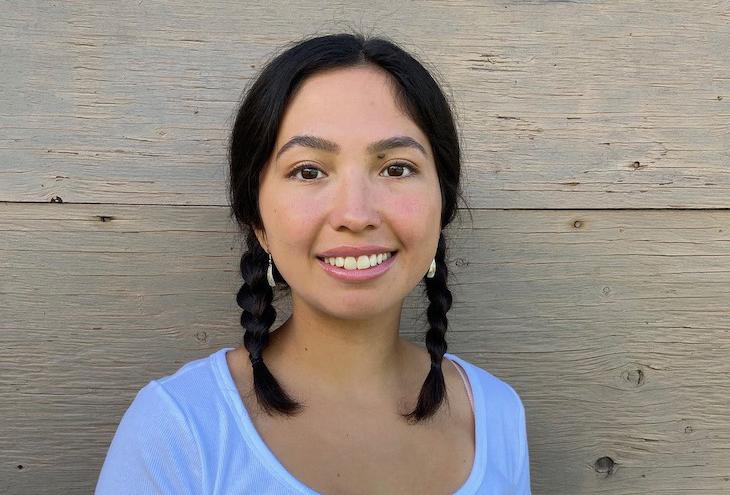Olivia Baptiste has been drawn to science since elementary school. “I loved presenting at the science fairs,” she says. That interest has blossomed into focused studies in biology at the University of British Columbia in Vancouver. While the field has always been a favorite of hers, the biology course she took in her first year cemented her interest. Now in her third year at UBC, she is preparing for the MCAT and pursuing her goal of becoming a physician someday.
After living with her grandmother on the Soda Creek Indian Reserve for four years, Baptiste and her parents moved an hour away to Quesnel, B.C., a small, rural town surrounded by beautiful mountains, lakes, and rivers. During elementary and high school in Quesnal, Baptiste was encouraged by her mother, a dental hygienist, and her father, a cutoff saw operator at a local lumber mill. “My parents have always supported me in my passions for science and health care,” she says.
In high school, she figured out that she wanted to be either a nurse or a physician, and her parents helped her plan her career path. She volunteered at a hospital throughout her high school years, which gave her a good sense of how rewarding the work can be. “Volunteering allowed me to explore my passion for speaking with patients and tending to their needs,” she says.
She attributes the growth of that passion to her grandmother, a residential school survivor and role model of care and compassion. “She has cared for so many people and is the most generous person I’ve known,” says Baptiste. After Baptiste’s first year at UBC, forest fires forced her grandmother to move in with Baptiste’s family. Throughout the summer, Baptiste took care of her grandmother every day, just as her grandmother had cared for others, an experience she found deeply gratifying. “I realized that I was following in her footsteps,” says Baptiste.
Like many students who go from a small town to a big campus, Baptiste says the move from rural Quesnel to a large city university was a major challenge. “I found Vancouver to be overwhelming,” she says. “I was very homesick in my first year. I found it hard to make friends and join groups on campus.” She struggled to keep up with the academic workload until she discovered the resources provided by the UBC Longhouse (a cultural center for Indigenous students). There she found tutoring and the First Nations House of Learning, which helped her manage her coursework.
By being resourceful, she stayed on her path. “My determination has helped me persevere in hard times, specifically with academic work,” says Baptiste. That self-motivation has also helped her improve her communication skills, whether through her lab work or as a member of .caISES (the Canadian Region of AISES). She was the vice president of UBC .caISES in her second year and co-president during the 2019–2020 year. She was able to attend a Canadian National AISES Gathering in Saskatchewan and forge connections with other AISES members there. AISES has also helped Baptiste meet more Aboriginal students at UBC and plan STEM events for Aboriginal youth in Vancouver.
In her second year at UBC, she was accepted into the Indigenous Undergraduate Research Mentorship Program and paired with Dr. Jörg Bohlmann in the Faculty of Forestry. She applied for and was granted the Undergraduate Student Research Award by Canada’s Natural Sciences and Engineering Research Council. Through research with Dr. Bohlmann and under a postdoctoral fellow on a Crocosmia (a genus of flowering plants) project, she learned valuable skills. At the end, Baptiste was able to present her findings to her lab group.
Now she’s well on her way to her goal. From listening to her grandmother, she knows there’s a need for more First Nations doctors. She is determined to fulfill her grandmother’s wish. She wants to become a physician and work closely with First Nations communities providing health care to rural areas.













